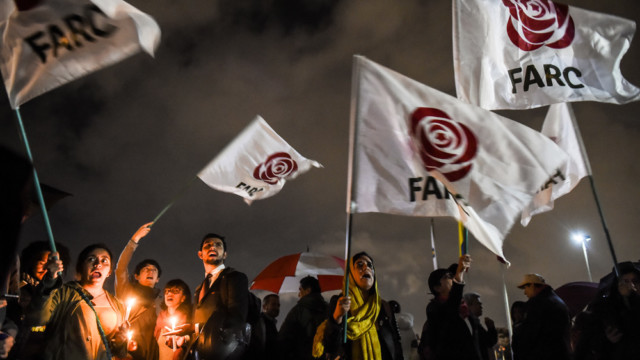A controversial arrest in Colombia is threatening a fragile peace deal.
A prominent member of the demobilized guerrilla group, FARC, has been arrested and charged with drug trafficking.
FARC leaders are condemning the arrest, but conservative politicians say the investigation should be expanded to include more members of the group.
CGTN’s Michelle Begue has more from Bogota.
On Monday Colombian federal agents arrested FARC member Seuxis Paucis Hernández Solarte, who is known by his alias “Jesus Santrich.”
An indictment unsealed in U.S. federal court alleges Santrich and three others attempted to produce and distribute nearly 10,000 kilograms of cocaine from Colombia to the U.S. The suspects could face a sentence of 10 years to life in prison if convicted.
Santrich was a member of FARC’s main delegation at the 2016 peace negotiations between the Colombian government and the former guerrilla group.
After the arrest, President Juan Manuel Santos said that, while the “vast majority of former fighters have complied with the accord,” there will be no tolerance for those who break the law.
He added that “if due process is followed, and if there is irrefutable proof, there is room to carry out extraditions for crimes committed after the signing of the accord. I will have no hesitation in authorizing that.”
A day after the arrest FARC members called a press conference and said the indictments and arrests were part of a set up by the United States.
FARC spokesperson Ivan Marquez said, “With the capture of our colleague Jesus Santrich, the peace process is at its most critical point and threatens to become a complete failure.”
While FARC leaders reiterated their commitment towards peace, politicians and experts have begun debating how this will affect the deal.
Analyst Jairo Libreros says the arrests provide an opportunity for the government to show citizens that the post-conflict transitional justice system created by the peace deal is efficient and strong.
The case will be taken to Colombia’s Special Jurisdiction for Peace.
“The court will have to show that they are capable of providing a respectful due process, as well as an agile process,” Libreros said. “It will have to be very precise in showing whether or not the events actually took place after the signing of the peace agreement, and if so, to allow the ordinary courts to issue an extradition.”
Under the peace deal, FARC is allocated 10 seats in Colombia’s congress. Santrich was set to fill one of them.
 CGTN America
CGTN America
 Supporters of the FARC demonstrate in the surroundings of the General Prosecutor’s Office in Bogota on April 9, 2018, against the arrest of the FARC’s ex-peace negotiator, Jesus Santrich, at the request of a US court for drug trafficking.
Colombia’s former rebel group Revolutionary Armed Forces of Colombia (FARC) laid down arms and become a political party under a 2016 peace deal as uses the same Spanish acronym, which now stands for the Common Alternative Revolutionary Force. (AFP PHOTO / Raul ARBOLEDA)
Supporters of the FARC demonstrate in the surroundings of the General Prosecutor’s Office in Bogota on April 9, 2018, against the arrest of the FARC’s ex-peace negotiator, Jesus Santrich, at the request of a US court for drug trafficking.
Colombia’s former rebel group Revolutionary Armed Forces of Colombia (FARC) laid down arms and become a political party under a 2016 peace deal as uses the same Spanish acronym, which now stands for the Common Alternative Revolutionary Force. (AFP PHOTO / Raul ARBOLEDA)
